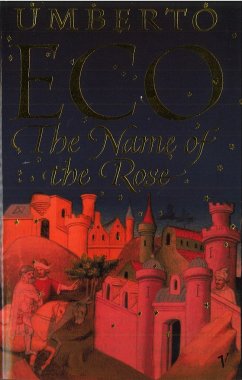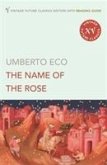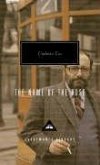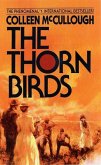Smart new jacket to tie in with "Island Of The Day Before" which is due to be published in October.
Franciscans in a wealthy Italian abbey are suspected of heresy, and Brother William of Baskerville arrives to investigate.When his delicate mission is suddenly overshadowed by seven bizarre deaths, Brother William turns detective.
Franciscans in a wealthy Italian abbey are suspected of heresy, and Brother William of Baskerville arrives to investigate.When his delicate mission is suddenly overshadowed by seven bizarre deaths, Brother William turns detective.
"Explodes with pyrotechnic inventions, literally as well as figuratively. Hold on till the end." - New York Times
"Like the labyrinthine library at its heart, this brilliant novel has many cunning passages and secret chambers . . . Fascinating . . . ingenious . . . dazzling." - Newsweek
"The Name of the Rose succeeds at being amusing and ambitious at the same time. It can be regarded as a philosophical novel masked as a detective story, or a detective story masked as a historical novel, or even better as a blend of all three. The venture sounds improbable, but Eco carries it out." - New York Review of Books
"A brilliantly conceived adventure into another time, an intelligent and complex novel, a lively and well-plotted mystery." - San Francisco Chronicle
"Whether you're into Sherlock Holmes, Montaillou, Borges, the nouvelle critique, the Rule of St. Benedict, metaphysics, library design, or The Thing from the Crypt, you'll love it. Who can that miss out?" - Sunday Times (London)
"Unfolds in an atmosphere thick with hostility and intrigue . . . Although The Name of the Rose is not a story of semiotics, Eco the novelist shares with Eco the semiotician a feeling for the world as a place rich with possible meanings." - Christian Science Monitor
"Like the labyrinthine library at its heart, this brilliant novel has many cunning passages and secret chambers . . . Fascinating . . . ingenious . . . dazzling." - Newsweek
"The Name of the Rose succeeds at being amusing and ambitious at the same time. It can be regarded as a philosophical novel masked as a detective story, or a detective story masked as a historical novel, or even better as a blend of all three. The venture sounds improbable, but Eco carries it out." - New York Review of Books
"A brilliantly conceived adventure into another time, an intelligent and complex novel, a lively and well-plotted mystery." - San Francisco Chronicle
"Whether you're into Sherlock Holmes, Montaillou, Borges, the nouvelle critique, the Rule of St. Benedict, metaphysics, library design, or The Thing from the Crypt, you'll love it. Who can that miss out?" - Sunday Times (London)
"Unfolds in an atmosphere thick with hostility and intrigue . . . Although The Name of the Rose is not a story of semiotics, Eco the novelist shares with Eco the semiotician a feeling for the world as a place rich with possible meanings." - Christian Science Monitor








